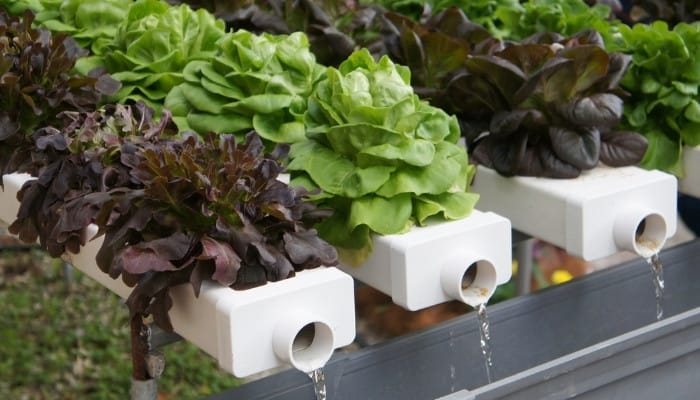Are you finding yourself overwhelmed by all the technical terms associated with hydroponics, despite your newfound interest in it? We understand.
There are many need-to-know terms when it comes to understanding hydroponic basics, and one of the most commonly heard is “nutes” – but what the heck are these?
What are nutes? Nutes refer to hydroponic nutrients, which are the basis of any hydroponic system. Hydroponic nutrients are essentially liquid plant food composed of nitrogen, phosphorus, and potassium in addition to secondary nutrients. This formula is mixed with water and added to hydroponic reservoirs.
This nutrient-rich solution is then pumped from the main reservoir of your chosen hydroponic system directly to your plants.
You can either buy pre-mixed formulas or mix the nutrient ratios yourself once you’re more knowledgeable. Let’s look at the whys and hows of hydroponic nutes.
Hydroponic Nutes
Like liquid fertilizers for garden plants, hydroponic “nutes” are a liquid formula containing all the essential food your plants need to prosper in the absence of beneficial soil microbes.
Why Nutrients Are Important for Hydroponics
While light and oxygen in their immediate environment ensure plants’ survival, hydroponically grown plants simply won’t develop without 17 essential macro/micronutrients.
Each one has a specific role to play from encouraging photosynthesis to activating enzymes and turgor pressure.
How Nutrients Are Used in Hydroponics
These nutes are mixed with water before being measured per your hydroponic system and added to your water reservoir/supply, creating a nutrient-rich solution that is sent from a water pump to your plants.
Hydroponic Macronutrients
These are the nutrients all plants require higher amounts of to thrive:
- Nitrogen
- Phosphorus
- Potassium
Plus:
- Calcium
- Sulfur
- Magnesium
Hydroponic Micronutrients
Other essential nutrients are needed in smaller quantities include:
- Iron
- Zinc
- Manganese
- Molybdenum
- Boron
- Copper
- Chlorine
- Nickel
Are Hydroponic Nutrients Organic?
Hydroponic nutrients derive from organic sources but as they often rely on treated mineral fertilizers, they’re not always considered strictly organic.
A hydroponics system known as NFT (Nutrient Film Technique), however, uses a nutrient solution produced by organic digestion – making it certified organic according to the National Organic Program.
Best Hydroponic Nutrient Solution
As you become more experienced with hydroponics, you may start to alter the macronutrient ratios to suit specific plants.
For beginners/hobbyists though, an all-purpose nute bundle, like this pick below, is ideal!
General Hydroponics 3-Part Nutrient System
This nutrient solution trio delivers maximum results at the leaf-flower-fruit stage of your plant, though one bottle can provide the necessary macro and micronutrients for an entire growth cycle if you’re new to hydroponics.
Instructions:
- Start with a reservoir filled with water.
- Add the different nute concentrations one by one, stirring well in between each addition.
- Mix in ¼ tsp solution/gallon for seedlings, 2 tsp/gallon for mild growth, 3 tsp/gallon for aggressive growth, etc.
Related Questions:
Do You Have To Use Nutrients for Hydroponics?
As a soilless growing system, plants grown hydroponically do not have access to all the vital nutrients that soil would normally provide, so this is replicated by a nutrient-rich liquid or water-soluble formula added to your water supply.
What Fruits Can Be Grown in Hydroponics?
You can easily grow strawberries, raspberries, and blueberries since hydroponics allows for greater pH and nutrient control than traditional methods.
More experienced growers also cultivate watermelon, cantaloupe, and other tropical fruits.
Conclusion
Essentially, “nutes” are what’s added to the water supply in your hydroponic system to help plants grow.
They contain vital macro and micronutrients that provide different yet equally important benefits to your plant. Use a pre-mixed all-purpose nutrient formula to get started with hydroponics!

